Buddhism returns to its birthplace as urban Indians find in it an emotional anchor for their troubled lives. (Source Outlook Feb:2009)
Not perhaps since Buddhism's heyday, some 2,200 years ago, did such a power crowd gather to pay their tribute to Gautama Buddha in the land of his birth. Among the 6,000 of I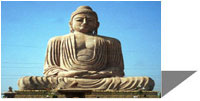 ndia's well-heeled and well –connected who assembled at the opening of the country's grandest monument in recent times to the Buddha –the Rs100-crore Global Vipassana Pagoda, “the largest dome in the world”- in Mumbai's Gorai island last Sunday were the President, a governor, several central and state ministers, and industrialist, a media baron and the Buddha's star new –age disciple, Priyanka Gandhi Vadra. Like Priyanka, there's a new wave of Indians- affluent, rational, Metropolitan, English- educated individuals impatient of organized religion and willing to experiment with alternate spiritual forms- who are increasingly turning to the Buddha's teachings for answers to their dilemmas. A far cry from Ambedkar and his Dalit followers who converted.
ndia's well-heeled and well –connected who assembled at the opening of the country's grandest monument in recent times to the Buddha –the Rs100-crore Global Vipassana Pagoda, “the largest dome in the world”- in Mumbai's Gorai island last Sunday were the President, a governor, several central and state ministers, and industrialist, a media baron and the Buddha's star new –age disciple, Priyanka Gandhi Vadra. Like Priyanka, there's a new wave of Indians- affluent, rational, Metropolitan, English- educated individuals impatient of organized religion and willing to experiment with alternate spiritual forms- who are increasingly turning to the Buddha's teachings for answers to their dilemmas. A far cry from Ambedkar and his Dalit followers who converted.
Today, Archana is the leader of the young women's division in her locality of the Bharat Soka Gakkai (value creation society, BSG) inspired by the teachings of 13 th century Japanese Buddhist monk Nichiren, adapted to contemporary times by its mentor, Daisaku Ikeda, and now flourishing in 192 countries with a membership running into tens of millions. Archana is expected to make at least two “ home visits” a week in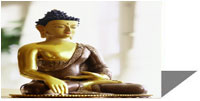 a system that is unique to BSG: each leader being charged with responsibility for the happiness and well- being of every individual attention. It's a practice. Archana says , that gives her deep
a system that is unique to BSG: each leader being charged with responsibility for the happiness and well- being of every individual attention. It's a practice. Archana says , that gives her deep
fulfillment by mentoring other young women like her facing job insecurity and social turmoil of other kinds. “ If one person has a problem, everyone rallies around. It's a philosophy, which is easy to apply to daily life. You being to understand how your inner life works and learn to take responsibility for your own happiness.” The combination of community chanting, individual counseling and a support system that works like an extended family without its handicaps has turned the BSG into an impressive organization of over 38000 members in 300 cities in India in a little over two decades.
SHANTUM SETH (Source Outlook Feb: 2009)
ORDAINED ZEN TEACHER
AFTER quitting my job as a footwear technologist, I worked as an activist, until I realized I was burning out. I was working for peace, but 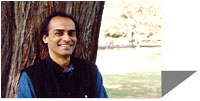 was not at peace myself. That's when I started my spiritual search, trying every-thing, including Vipassana and several forms of Buddhism. My search ended with Thich Nhat Hahn, who I discovered practiced a form of engaged Buddhism. It's a 24- hour practice where you are attentive to every moment of the day, while you are walking, eating, driving, and bringing the mind back to the present moment through your breathing. In this practice, your family is your sangha, so I practice mindful living with my wife, Geetu, and we have a practice called beginning Anew, where every full moon night we renew our vows of living mindfully and joyfully.
was not at peace myself. That's when I started my spiritual search, trying every-thing, including Vipassana and several forms of Buddhism. My search ended with Thich Nhat Hahn, who I discovered practiced a form of engaged Buddhism. It's a 24- hour practice where you are attentive to every moment of the day, while you are walking, eating, driving, and bringing the mind back to the present moment through your breathing. In this practice, your family is your sangha, so I practice mindful living with my wife, Geetu, and we have a practice called beginning Anew, where every full moon night we renew our vows of living mindfully and joyfully.
SUBHASH CHANDRA
INDUSTRIALIST & MEDIA BARON ( Source Outlook Feb : 2009)
I did my first Vipassana course in 1990- not to make me a Buddhist, but a person more in tune with myself. Since then I've done at least one course every year, and Iam passionate about it. When one course observes silence for 10 days, it is time one spends with oneself; otherwise you are working for something or the other, including your own ego. Vipassana helps you control that. I make the time to practice Vipassana every day, for about 45 minutes. It has helped me control my anger, and it has taught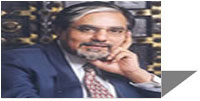 me to handle any situation, involving anybody or anything in the world, in an euonymus manner. And to have that in today's world is a big thing. In our business group, if anybody wants to do a Vipassana course he/she is given time off; it's not counted as leave.
me to handle any situation, involving anybody or anything in the world, in an euonymus manner. And to have that in today's world is a big thing. In our business group, if anybody wants to do a Vipassana course he/she is given time off; it's not counted as leave.
To skeptical outsiders, especially educated middle-class professionals with their horror of anything that smells of organized religion, the extreme organization.
And zeal to induct new comers into the practice, along with the strict rules of confidentiality, seem almost Masonic sometimes. But within the BSG, it's hard not to be moved by members' sincerity and genuine concern for others. And it's impossible to spot and unhappy face. It's not as if they don't have their problems, some of them huge, like cancer. But as BSG head Naveena Red di explains, the chanting works as way of transforming negative thought into positive. More important, members are taught to chant for the happiness of those they don't like. What also keeps them upbeat is sharing their experiences- under strict confidentiality – of how the practice has changed their lives. Countless stories emerge fo daily miracles wrought by individual and community chanting – improved relations within the family and at work, promotions that land suddenly in one's lap, cancers that recede, eyesight restored. But it's not just spiritual therapy, as Reddi stresses. What the practice hopes to bring about is a change in the world through a “human revolution, leading members to fight for a world in which Buddha's core values of peace and non –voilence are propagated in contemporary times, whether it is in dealing with issues like global warming , the anti-nuke compaign or greening the earth the interconnected universe through different paths, but inspired equally by the Buddha's teachings. Vipassana which means to see things as they really are is a meditation practice popularized by the Buddha, and returned to the land of his burth by an Indian businessman domiciled in Burma, satyanarayan Goenka. Having become an ardent practitioner in Rangoon, Goenka came back to India in 1969 to revive it here. Vipassana, as the points out in his talks and books, involves no dogma, rites, rituals, comversion. The only comversion is from misery to happiness, from bodage to liberation.
di explains, the chanting works as way of transforming negative thought into positive. More important, members are taught to chant for the happiness of those they don't like. What also keeps them upbeat is sharing their experiences- under strict confidentiality – of how the practice has changed their lives. Countless stories emerge fo daily miracles wrought by individual and community chanting – improved relations within the family and at work, promotions that land suddenly in one's lap, cancers that recede, eyesight restored. But it's not just spiritual therapy, as Reddi stresses. What the practice hopes to bring about is a change in the world through a “human revolution, leading members to fight for a world in which Buddha's core values of peace and non –voilence are propagated in contemporary times, whether it is in dealing with issues like global warming , the anti-nuke compaign or greening the earth the interconnected universe through different paths, but inspired equally by the Buddha's teachings. Vipassana which means to see things as they really are is a meditation practice popularized by the Buddha, and returned to the land of his burth by an Indian businessman domiciled in Burma, satyanarayan Goenka. Having become an ardent practitioner in Rangoon, Goenka came back to India in 1969 to revive it here. Vipassana, as the points out in his talks and books, involves no dogma, rites, rituals, comversion. The only comversion is from misery to happiness, from bodage to liberation.
PRIYANKA GANDHI VADRA 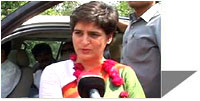
GANDHI FAMILY SCION ( Source Outlook Feb : 2009)
THOGH she guards her privacy fiercely, it is an open secret that Priyanka Gandhi Vadra has turned to Buddhism in her quest for personal peace. A Vipassana practitioner for 11 years, she has done many courses, including the advanced, very rigorous and intensive Sattipatahana courses, as taught by S.N Goenka and his vopassana Sadhana Sansthaan. Last October she also participated in a retreat to learn niques. Priyanka is currently in the last year of completing her MA in Buddhist studies.
A . SUBRAMANIAM
NUCLEAR SCIENTIST ( Source Outlook Feb : 2009)
VIPASSANA has a scientific basis, that's why it appealed to me. In my spiritual quest I had visited Chinmaya Mission, Ramakrishna Mission to fine answers. Then, in 1992, when I was Mumbai (with BARC) my wife Janki and I went to Igatpuri and did the vipassana course. The first three days were difficult, but by the 10 th day my mind felt free. After longer courses, I felt free of fear and tension. In 94 I moved to Kalpakkam, and now teach at least two courses in Tamil. Our son and daughter have also done courses in Tamil. Our son and daughter also done courses. Vipassana makes you compassionated. When Janaki's mangalsutra was snatched, she and I meditated for the snatcher so that he could come out of his suffering.
BUDDHISM : IN ALL ITS
MODERN AVATARS ( Source Outlook Feb : 2009)
Buddhist teachers modify its tenets to make them relevant for contemporary times. WHO'D have though, for instance, that the five vows the Buddha laid down centuries ago would fine a resonance with affluent, educated professionals here? But Buddhist teachers have challenged themselves to come up with an ethical framework that works for everyone in our fractious, tumultuous times. Scores of Indian, for example, gathered at Thich Nhat Hanh's five day retreat in Delhi to take the five pledges in terir new-age form, with due ceremony and solemnity under a Bodhi tree in the Nehru Memorial grounds.
THE FIVE PLEDGES
Don't kill : Far from a simple injunction to turn vegetarian, this pledge urges you to take up a more environment- friendly lifestyle: determine to protect the lives of people, animals. Plants and minerals.Loving kindness or compassion : Commit oneself to share one's time, energy and material resources with those in real need further, prevent others form profiting from human suffering or the suffering of other species.
Responsible Sex : Not to engage in sexual relations without love and long term commitment. Do everything in one's power to protect children from sexual abuse and to prevent couples and families from being broken by sexual misconduct.
Loving speech : Not lying, but also a commitment not to spread news that one does not know to be certain and not to criticize or condemn things of which one is not sure. And to regrain from uttering words that can cause division or discord, or that can cause the family or community to break. Determine to make all efforts to reconcile and resolve all conflicts however small.
No toxins : This included, apart from the usual intoxicants, a pledge to stay away from toxic TV programmes, magazines, books, films and conversations,. A pledge to transform violence, fear, anger and cofusion in oneself and in society by practicing a mindful diet crucial for self and social transformation.
BSG mentor Diasaku Ikeda has likewise laid down pragmatic rules for changing the world through the individual's transformation: To challenge oneself at all times so that from being buffeted about by the environment or people around you, a person becomes someone who can change his or her environment;
To grow from interaction with others rather than in isolation;
A commitment to realize all your hidden potential towardsthe goal of self- realization;
A commitement to be happy despite problems;
Not to run away form oneself but to change from within;
To stay free of fear;
Never to compare oneself with others , but with ourselves as we were yesterday.
Under the Bodhi tree thich Nhat Hanh in New Delhi
RINA DHAKA
FASHION DESIGNER ( Source Outlook Feb : 2009)
I had a sleep disorder for which I tried everything: yoga, therapy, acupuncture, self- help books. Then, a friend suggested I try chanting. It worked, and I joined the Soka Gakkai. I find this much easier than meditation because your eyes are open, your mouth is working ( I am such a chatterbox). With chanting your mind trains itself without any effort. Things began to change After 7-8 years I eel a huge difference. From the depressed state I was earlier, I am happier, more balanced, and don't snap as much at my workers in my small manufacturing unit. It has reduced the dropout rate there. It has also reduced my greed – earlier I couldin't go past a jewellery shop without being tempted to buy something
When he brought Vipassana to India 40 years ago, there were about a dozen people, including Goenka's parents. Willing to sign up for the meditation course. Now there are more than 55 percent in India, from Sonepat in Haryana to Chengannur in kerala, from Jaipur and Ajmer to Dehradun and Durg. Over a million have joined up for the 10 day retreat, where beginners are taught : mental purification through self- observation.”
Students lead a frugal life – no talking, sex, meat, drinks, news near-total silence. Just refraining form these familiar distractions is the first step for the mind to calm down, followed by three-and a half days of anapana meditation focusing on your breath, followed by six and a half days of a guided med itation where the student learns to observe changes in his body and its sensations as a way to gain equanimity. So popular have the courses become that the waiting lists are growing by the day. This mushrooming of new age forms of Buddhism is a recent trend in our cities, points out Pankaj Mishra, whose book – an End to suffering: The Buddha in the world – is voyage to rediscover Buddhism in the land of its birth centuries after it was wiped out. Several members fo my own family, even my land lady in Defence Colony all with and upper- caste Hindu upbringing, have signed up with some Buddhist orgainisation or the other” he says. For Mishra, this Second coming of the Buddha is in the fitness of things because it has found and audience similar to the one the Buddha originally aimed his message at: a modernizing society and its rising commercial classes. Buddha was
itation where the student learns to observe changes in his body and its sensations as a way to gain equanimity. So popular have the courses become that the waiting lists are growing by the day. This mushrooming of new age forms of Buddhism is a recent trend in our cities, points out Pankaj Mishra, whose book – an End to suffering: The Buddha in the world – is voyage to rediscover Buddhism in the land of its birth centuries after it was wiped out. Several members fo my own family, even my land lady in Defence Colony all with and upper- caste Hindu upbringing, have signed up with some Buddhist orgainisation or the other” he says. For Mishra, this Second coming of the Buddha is in the fitness of things because it has found and audience similar to the one the Buddha originally aimed his message at: a modernizing society and its rising commercial classes. Buddha was
conveying his message at a time of huge social upheaval when close-knit traditional bonds were being weakened ,whether in community or family networks. For people newly arrived in cities, , alone and anonymous, traditional religions were of little help. It's only natural as Mishra points out, that a post- liberalized India, with its spirituals and emotional exhaustion is increaseingly attracted to a from of Buddhism that provides spirituals sustenance at such times. The more society changes, the greater Buddhism's appeal, he says Besides, the idea of an individual not affiliated to any caste or community being a new one in India “ the Buddha's revolutionary concept of shifting the onus of spiritual health on the individual is bound to resonate. This hunger for a new moral and spiritual framework for how to live your life meaningfully without God as and intermediary is what is driving thousands of Indians to the Dalia Lama's teaching. Until a few years ago the pontiff's engagement diary was almost completely booked with his tours abroad or his teachings in Dharamshala, attended predominantly by his followers from abroad. No longer, says his representitative in Delhi Tempa Tsering. There's a distinct shift with nearly 60 per cent of his engagements reserved for his talks across India. In the last month and a half for instance the Tibetan leader was invited to address meetings in Rajasthan, Delhi, Hyderabad, Gulbarga, Chennai, Pondicherry , Delhi again, befor returing to his home Dharamshala for 10 days , then going for a brief tour to Germeny and Italy before leaving again for Bangalore and Mysore. Everwehere he goes, whether university campuses or hospitals – he was in Meerut recently to open a charitable hospital- thousand gather to hear his simple down to earth teachings, shorn of all dogma. The same thing happened when the Vietanamese Zen teacher, Thich Nhat Hanh came to India last October. Unlike his two previous visits once in 1988 on a private pilgrimage, and again in 1997, when he spoke before a small audience in Delhi and Chenai –the response to his last visit was overwhelming says shantum seth, who runs the Ahimsa trust for propare clear useful and timely, and appeal to a generation that was schooled in scientific rationalism. Unlike other religions, Seth points out, Buddhism encourages a spirit of ture inquiry- if it works for you adopt it without getting caught up in any ism. Its emphasis is on personal practice and self development which hugely attractive to the intellighetsia.
So will it last or will Buddhism vanish once more as it did in the past, wiped out by a disastrous mix of circumstances, including co-option into Hinduism and ritualism, and a decline of the commercial classes? Undoubtedly it will last, according to Mishra, who hails the Buddha as the greatest thinker India has ever produce by a huge margin. At a time when so many of our shiny modern ideologies have been discredited, says Mishra, the Buddha's teachings grow increasingly relevant as the guide to an ethical life. There's no way out for us except the Buddha's ways….
NANDITA DAS
ACTRESS ( Source Outlook Feb : 2009)
I have always stayed away from organized religion. But I do find myself seeking.. a spiritual anchor, answers to question beyond the reach of logic, a peace not just momentary, a newer path. In its various forms. Buddhism as a religious philosophy exudes a non- violent, compassionated and progressive way of being. I find it accessible and not rigid. Meeting the Dalai Lama, Daisaku Ikeda and Thich Nhat Hanh reinforced this belief. Also the fact that most feel the need to engage with global issues makes it more relevant. When a religion transcends beyond dos and don'ts and becomes a quest ffor the larger good of huminity, it becomes a philosophy worth following. Iam a beginner; Iam glad my journey has begun.
ARBAZ KHAN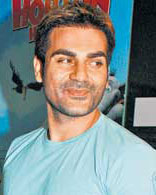
(Source Outlook Feb : 2009)
RECENTLY, I spent 10 days at the Vipassana centre in Igatpuri. The accommodation is very basic, you wake up at 4 am keep silent for 10 days – it's like living a sage's life. I learnt moment and let go of the past, of guilt or anything that is holding you from moving on.
UPEN BISWAS
FROMER CBI JOINT DIRECTOR (Source Outlook Feb : 2009)
As a police officer investigating serious criminal cases, my family and I received many threats. It was especially bad when I investigated the fodder scam, which involved powerful politicians. To deal with the trauma, I needed something that gave me immense peace. This I found when I embraced Buddhism. It was an individual decision. I took to the path of the Buddha for its moral quotient. There is a growing interest in Buddhist philosophy in Bengal , not so much as a religion but as a way of life. For example, I have friend in the Indian foreign service, a Bengali Brahmin, who embraced Buddhism because he identified with its philosophy of the importance of the self… Back To Top